#IndiaUKFTA #TradeDeal #BilateralTrade #MakeInIndia #GlobalTrade #EconomicGrowth #FreeTradeAgreement #BusinessNews #PolicyUpdate #ExportIndia #UKIndiaRelations #IndoUKTrade #PostBrexit #JobsAndGrowth #TariffFree
New Delhi/London | July 24, 2025
In a major boost to bilateral economic ties, India and the United Kingdom have officially signed the long-awaited Free Trade Agreement (FTA) on July 24, 2025, marking the culmination of over three years of negotiations. The deal is expected to nearly double the current trade volume between the two nations—from $60 billion in 2024 to $120 billion by 2030.
Prime Minister Narendra Modi and UK Prime Minister Keir Starmer jointly signed the agreement during a high-level ceremony held virtually, describing it as a “watershed moment” in India-UK relations.
Major Gains for India
Under the pact, the UK has agreed to provide zero-duty access to nearly 99% of Indian exports, particularly benefiting sectors such as:
-
Textiles and garments
-
Footwear and leather
-
Auto components
-
Marine products
-
Gems and jewellery
-
Engineering goods
Indian exporters will now face significantly reduced tariffs, with key industries such as textiles in Tiruppur expecting a 30–45% surge in exports. Similarly, the gems and jewellery sector, currently exporting around $400 million worth of products to the UK annually, anticipates crossing the $1 billion mark in the next few years.
Industry leaders such as Bata, Welspun, Arvind, and Relaxo are poised to benefit directly from improved market access.
UK Wins in Whisky, Automobiles, and Services
In return, the UK has secured substantial tariff reductions for:
-
Scotch whisky (reduced from 150% to 40% over 10 years)
-
Automobiles, especially high-end brands like Jaguar Land Rover and Aston Martin, with duties slashed from over 100% to just 10%
-
Cosmetics, medical devices, chocolates, salmon, and gin
UK exporters are projected to gain £4.8 billion in GDP annually, with an expected increase of £2.2 billion in wages, according to British government estimates.
Boost to Professional Mobility
The agreement also addresses the services sector and people-to-people ties. India has negotiated:
-
An exemption from social security contributions for Indian professionals working in the UK for up to three years, potentially saving ₹4,000 crore annually
-
Additional 1,800 visas annually for Indian professionals, including chefs, yoga instructors, IT experts, healthcare workers, and creative professionals
Agriculture and Strategic Exemptions
To safeguard domestic farmers, India has excluded key agricultural products such as dairy, apples, and cheese from tariff concessions. These items remain protected to ensure no adverse impact on rural livelihoods.
Meanwhile, Indian negotiators are still pushing for exemptions from UK’s Carbon Border Adjustment Mechanism (CBAM), which could impact steel and aluminium exports if not resolved in future talks.
Unresolved Issues and Roadblocks
Though the trade pact has been hailed as a major success, key components of the broader economic engagement—such as a Bilateral Investment Treaty (BIT)—are still under negotiation. Disputes remain over sunset clauses, investor protections, and retrospective tax claims.
There are also concerns from Indian MSMEs regarding compliance with new rules-of-origin and sustainability standards, which could increase operational costs.
Political Reactions and Industry Response
Industry experts and political leaders from both sides have welcomed the agreement.
Parag Raja, MD & CEO of Bharti AXA Life Insurance, called it “a progressive step not just for trade liberalization, but for building customer trust and reimagining international cooperation.”
UK Business Secretary Jonathan Reynolds described the FTA as “the most economically significant trade deal the UK has signed since Brexit.”
Prime Minister Starmer said the deal shows Britain’s commitment to a “global, outward-looking trading future.”
Strategic & Geopolitical Significance
The agreement comes at a time when both nations are seeking to diversify global partnerships—India amid a recalibration of its China strategy, and the UK post-Brexit. Analysts say the FTA is more than a trade deal—it reflects growing strategic trust and economic interdependence between the two democracies.
The UK’s Indo-Pacific tilt, outlined in its Integrated Review, views India as a “priority partner.” In turn, India views the UK as a gateway to Europe and a critical voice in climate change, tech transfer, and defence collaboration.
Implementation Timeline
The FTA will now go through ratification in both parliaments, with full implementation expected within 9–12 months. Tariff cuts and visa provisions will be introduced in a phased manner thereafter.
Conclusion
The India–UK Free Trade Agreement is being hailed as a historic step forward in bilateral relations. With ambitious tariff reductions, visa relaxations, and services liberalization, the pact could reshape the economic landscape for both countries.
However, its ultimate success will depend on effective implementation, the protection of vulnerable sectors, and sustained political will to resolve outstanding issues. For now, it sends a strong message: India and the UK are ready to build a future anchored in shared growth and strategic cooperation.

